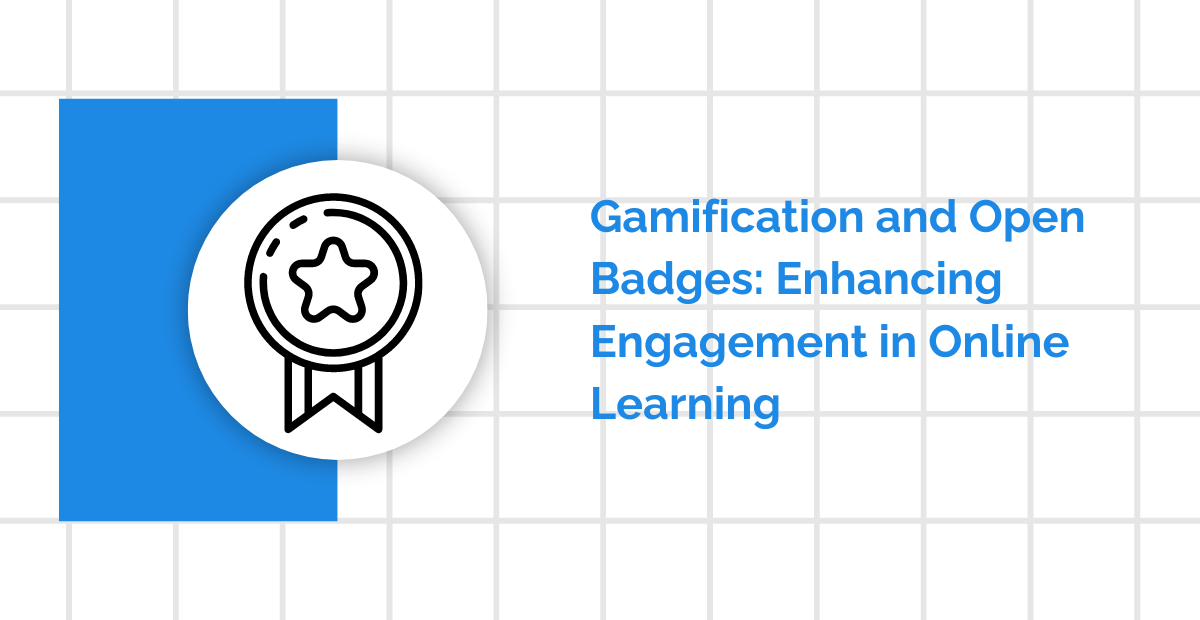Gamification and Open Badges:Enhancing Engagement in Online Learning
The rise of online learning platforms has made education more accessible than ever before, but it has also presented new challenges related to engagement and credentialing. In response to these challenges, two innovative concepts have emerged as key players in the world of online education: gamification and open badges. This blog explores the ways in which gamification and open badges can enhance engagement in online learning and offers insights into their application in higher education and employee training.
Gamification in Higher Education
Gamification is the integration of game design elements, such as competition, rewards, and interactive experiences, into non-game contexts, such as education. In the realm of higher education, gamification has gained momentum as a powerful tool for enhancing student engagement and learning outcomes.
One of the key aspects of gamification is the use of incentives and rewards to motivate learners. By incorporating elements like points, badges, and leaderboards into educational activities, instructors can create a sense of achievement and competition among students. For example, a professor teaching an online course might award badges for completing weekly quizzes or achieving high scores on assignments.
These badges serve as a visible representation of a student’s accomplishments, providing immediate feedback and a sense of progression. This sense of achievement can be a powerful motivator, encouraging students to actively participate in the learning process.
Open Badges and Digital Credentials

Open badges are a digital form of credentialing that emerged as a response to the need for a more flexible and portable way to showcase one’s skills and achievements. Unlike traditional paper certificates, open badges are digital images that contain metadata, including information about the issuer, the criteria for earning the badge, and the date of issuance. They can be easily shared online, added to digital portfolios, and verified by potential employers or educational institutions.
Open badges offer several advantages over traditional credentials:
-
Portability: Open badges can be displayed on various online platforms, making it easy for individuals to showcase their skills and achievements to a global audience.
-
Stackability: Learners can accumulate multiple badges to demonstrate a range of competencies. These badges can be stacked together to provide a comprehensive view of their skills.
-
Verification: Open badges are tamper-proof and can be verified by anyone with access to the internet, ensuring their authenticity.
-
Granularity: Badges can be designed to represent specific skills or achievements, allowing for a more detailed and nuanced view of a person’s capabilities.
Certifications as Open Badges
Certifications play a crucial role in both education and the workforce. They validate a person’s knowledge and skills in a particular domain and are often required by employers as proof of competence. In the context of open badges, certifications can be transformed into digital credentials, providing learners with a more flexible and accessible way to showcase their expertise.
For example, renowned organizations like Microsoft, Google, and Adobe offer certifications for various software applications and programming languages. These certifications can be issued as open badges, allowing individuals to share their achievements with potential employers and colleagues easily. When a prospective employer sees a candidate with a badge certifying their proficiency in a specific software tool, they can trust that the candidate possesses the necessary skills.
Gamifying Certification Programs
Integrating gamification into certification programs can make the process more engaging and rewarding for learners. Instead of simply passing an exam, participants can earn badges for completing specific training modules, achieving high scores on assessments, or demonstrating practical skills.
For instance, Salesforce, a leading customer relationship management (CRM) software provider, offers certification programs for professionals. They use a gamified approach by awarding badges for completing various training modules and achieving specific milestones. These badges are not only a source of pride for the certified professionals but also serve as a way to showcase their expertise within the Salesforce community.
Gamification Among Employees

Gamification is not limited to the realm of education; it has also found a valuable place in employee training and development. Employee engagement and skill development are critical factors for organizational success, and gamification can be a game-changer in this regard.
Here are some ways in which gamification can be effectively employed among employees:
-
Onboarding and Orientation: Gamified onboarding processes can make the integration of new employees smoother and more engaging. By completing various challenges, quizzes, and tasks, new hires can earn badges and learn about the company culture, policies, and procedures.
-
Skill Development: Many organizations use gamification to encourage continuous learning and skill development. Employees can earn badges and rewards for completing training courses, acquiring new skills, and staying up-to-date with industry trends.
-
Performance Management: Gamification can be applied to performance management systems, allowing employees to track their progress, set goals, and earn rewards for achieving targets. This approach fosters healthy competition and motivation among team members.
-
Team Building: Gamification can also be used to promote teamwork and collaboration. Team challenges, leaderboards, and collaborative quests can encourage employees to work together to achieve common goals.
-
Recognition and Rewards: Recognizing and rewarding employees for their contributions is essential for boosting morale and motivation. Gamified reward systems, such as point-based schemes and badges, provide tangible recognition for achievements.

 Author :
Author : 







